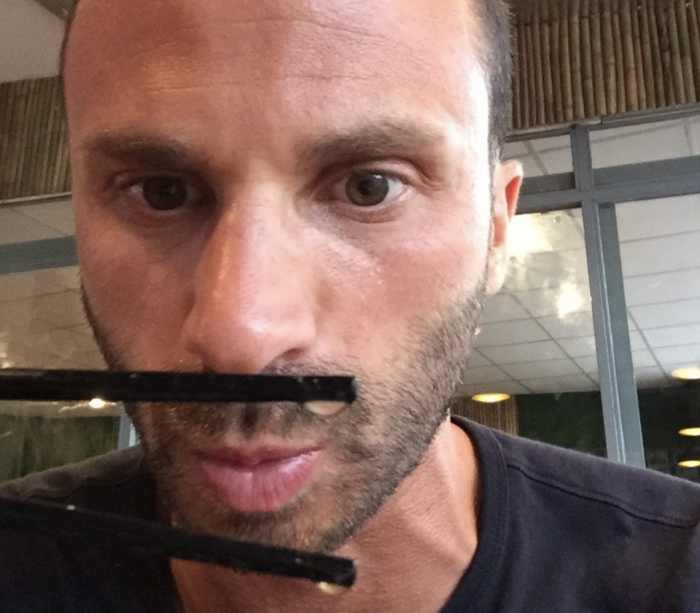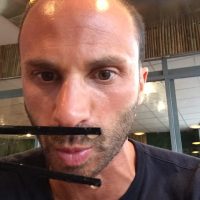Vietnam is a vibrant and gentle place.
There’s harmony among the people here, not aggressive and individualistic as in the United States.
Fishing and farming are still hardwired into the soul of this country, and all the new capitalism fits like a suit they aren’t used to wearing.
Every child in this country is adorable with thin, paint-stroke eyes and delicate limbs and black silk hair. The adults have the most placid faces as they ride their scooters through the tight city streets. It looks like chaos but is actually an elegant street ballet they all understand.
If I had to be here as a young G.I. in the 1970s, I’d probably would’ve lost my mind within weeks. I can’t imagine being a soldier—I’d be a terrible soldier.
There are lots of visual clashes of the ancient and modern: people in conical hats standing in rice paddies while staring at their iPhones.
The heat always wins here, unless you stay at 5-star hotels, where the air is icy, and everyone keeps bowing like I’m an emperor.
Hoi An
The My Son Temples pleased me aesthetically, but I felt no spiritual connection to them; all of it felt stiff, like how I remember church.
What did move me were the bomb crater indentations in the grass and the bullet holes in the temples, imagining 18-year-old American boys humping in the jungle, shooting their guns at these people and their temples. It seems like such a flawed and dangerous belief that we could’ve come in and stopped Vietnam’s communal rhythm.
It’s still a communist country, but it’s a nuanced version that bobs and weaves. Half of this country can’t name their president, and they mostly talk in public about their kids’ educations, food prices, and how much they paid for their scooter (according to my guide today).
I want to pet the water buffaloes and kiss them on their heads. The fishermen and women have such efficient muscular bodies, and all the older ones have black teeth and never stop smiling.
Pho is just a sexy noodle dish that feels like French kissing a girl more than eating.
The kids and their little wing bones make me weak with happiness.
Hoi An to Da Nang to Hue
Communism, plus debilitating heat, makes everyone languid—shirtless men sitting on low plastic stools, slow and mellow like they’re all sipping Benadryl.
On the way to Hue, driving through the jungle, I could understand how a young man vibrating with fear and substances, delirious in the heat, could become an absolute killing machine.
Ho Chi Minh had a quiet, hypnotic power—I can feel it just from the pictures. His house on stilts reminds me of a serene Vermont lake house. He had a feminine face, a pretty face like bin Laden, and he could move mass groups of people through whispers.
Ho Chi Minh City (Saigon)
So many streets here could be South Beach, as they are ultra-lux and polished. Capitalism reigns supreme, hotels with helipads, prettier people but no grimy mysterious French charm. It’s like a capitalist party down here, reveling far from the communist headquarters of Hanoi.
Different rules, different feel.
Sh*tting your brains out in a nice hotel with cool, glossy floors can actually be meditative and wonderful.
The war remembrance museum is heavy; no audio tours are allowed. You just take in the photos and read the plaques quietly. The language they use in there to describe us betrays the cheery servitude I’ve witnessed and is instead pregnant with a boiling hot anger, bafflement, and heartbreak.
But so many of the photos don’t move me anymore due to overexposure, though it’s different when you’re absorbing them next to an Asian family. Even if they are Chinese or Cambodian and not Vietnamese, it made the experience hit harder and more humbling—and also created a strong disgust for my country and its hubris.
Pictures that did move me were of effects from Agent Orange. Terrifying the generational damage that poison has caused: babies with learning disabilities and rashes, born with no eyeballs. People harmed have tried to sue the responsible producers to no avail.
We spray and don’t think.
Sunday night in Saigon feels like Friday night in Miami, lots of street activity, families eating, Vespers slightly more organized here but not really, streetlights and lines still just suggestions.
I met two college kids eager to talk English.
When they learned I was traveling alone and not married with kids, they seemed genuinely baffled and concerned.
Both like rap, then the boy said “Eminem” and closed his eyes and asked, “and also the father of Eminem?” and I said, “Dr. Dre?” Both nodded and smiled hugely, and then the girl threw up her slender Vietnamese hand and sang in her best Snoop Dogg voice, “La la la, it’s the mother f*ckin’ D-O double G!”
Snoop and Dre have reached the youth in Saigon.
The little kids look so at peace clinging to their parents as the family Vespa flies through the streets, little toddlers rest their heads on the front, wearing mini smog masks, only their black baby eyes looking out all sleepily, ready for naps.
Mekong Delta
A vast fertile loamy plate of earth, an explosion of fruit, rice, and teeming rivers. Tiny bananas, jackfruit, mangoes, lychees, and gon (where Saigon got its name, a cucumber-shaped fruit that cracks open to a cottony substance they use to make pillows). The fruit makes me think of juicy reds and purples and yellows and soft oranges and verdant greens.
Our corn and soybean midwestern breadbasket seems so bland and mono and beige in comparison.
The water buffaloes, the people, the dogs—everything is leaner and more emaciated in the river villages; also more loose chickens strutting around, and the dogs scratch their fleas aggressively.
More trash on the side of the road too, and occasionally there’re piles that bloom next to a store in lurid colors that make my hygiene-conscious wiring recoil.
Pictures are not encouraged here because the villagers are superstitious (the fishermen paint eyes on the front of their boats to ward off crocodiles), and some believe pictures can steal their souls.
Walking down the road, though, a group of teen boys whipped out their phones and filmed me. Sample conversation as they watch it later tonight; “That Tiger Beer Man, he comes to our country and drink all the Tiger Beer and eat many bowls of pho and spill broth everywhere.”
The river is a silty mocha, and you want it to stay that way, not become clear because clear means the salty ocean seeped in, and mocha silt is rich nutrient water that fish gum up with their pouty lips and get all fat on and delicious and thick with protein.
But the rivers are f*cked, Chinese companies salivating for cheap hydropower and building dams that disrupt the natural health of the river, and the people who live on them have no political clout. Freshwater dolphins will be gone soon for sure, and the three dollars billion worth of fish that’s pulled out of the water every year just won’t happen unless the dams stop.
I watched a sinewy man in a soiled shirt peeling coconuts—he does 1,200-3,000 a day, pressing the fruit ball into a metal spike that splits the husk and makes a satisfying noise: dry husk peeling against metal.
Such a wide divide between the murky raw products (oil, husks, fruit) and the way our beauty products market them to us urban princes and princesses to keep us smooth and moisturized and fancily hydrated.
There’s a machine to peel the coconuts, but some landowners are humane and reserve the work for humans, but this doesn’t seem like it will last, and as more artificial intelligence moves in, it’ll be like the Detroit Ford/Chrysler communities, just more disruptive and devastating.
I don’t know what alternate avenue a sinewy full-time coconut peeler with a soiled shirt would take if that job gets replaced by a machine that can be turned on by pressing a button on a tablet. Also, the shift will be quieter suffering compared to the loud panic pushback we hear from Detroit—less media, less cameras, less attention.
Saw the area where they burn coconut shells into coal for fuel. I could smell the carcinogens these locals breathe in every day. The dust settles into their hot, dilated pores, right into their bloodstream—life spans short, cancer rates high, but tight family units.
I am tired of worrying about what the ice in my drink or vegetables in my pho will do to my stomach. Every bite I eat off my fork in the United States is an activity of zero dread. It’s quite the opposite here—always a “well, let’s see how this goes” mentality to eating.
Walked barefoot in a Cao Dai temple, the most impractical religion—a mix of Buddhism, Hinduism, Catholicism, Confucianism, and Islam. You basically have to pray all day, and there’s no way rap listening teens are signing up, so Cao Dai will probably suffer a similar fate as the river.
I wandered up to the front prayer area and tripped over a tiny blue pillow, and when I stumbled forward, I had a flash of resistance like I was being electrocuted and told to leave.
Cu Chi Tunnels
Vietnamese is a watery burble of a language, and my throat isn’t designed for it, not even a hello or pho, so I don’t communicate with words.
When the people who are fascinated by my foreignness and I lock stares, there’s a brief moment where we sniff each other out with our eyes, and then if it feels right.
I smile and flash a peace sign, and then they absolutely light up—universal, wordless communication and pleasure.
The tunnels are tight and make you pant, such a sneaky and deadly network, and so many vicious traps underneath the jungle floor, a blind step then the false floor drops out, and the pull of gravity plus the weight of your body is all it takes.
I crawled through a really tight one, and when I popped out, a circle of White tourists asked where the guide was, and without thinking, I said, “I killed him.” I thought it was a funny joke but only got some nervous laughs in response.
There’s a hearty alcoholic bear of a man, a dentist from Southern California that I’ve spent time with on two different rivers and became drinking friends. He always wants to buy me a beer and tell me about the freshwater clumps of vegetation that thrive as they float downriver and how they die when they hit saltwater and how the clumps in the Amazon river were even wider and thicker.
Every time we drink beer and discuss the rivers, he speaks about the vegetation clumps with such boyish wonder and awe. I believe it’ll be the memory that rises to the surface most vividly as he lays on his deathbed.
Crossing the street in Saigon is madness: you step out, and it looks like a bank of scooters bearing down on you, then you step forward cautiously but firmly, and they actually slow down, and you weave like this until you get to the other side.
But sometimes, when there’s a clean break, I still run for my life until I’m safely on the other side.
I ate a final dinner at Henry Cabot Lodge’s house (the former United States ambassador). An elegant French colonial building that sat right in the middle of Saigon urban warfare nightmare. The noodles and pork and prawns were fancier—and cleaner.
Why do Americans crave burgers most when they travel to faraway lands?
I woke crying late at night thinking of all my friends and family and how much I love them. Now it’s time to pack and leave.
Vietnam found my heart—a magical country that worked on me like medicine.
~







Read 3 comments and reply